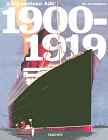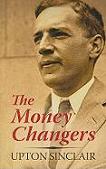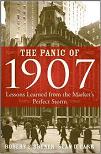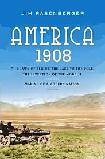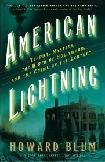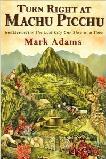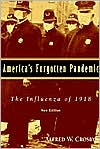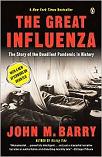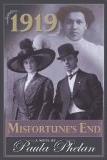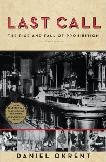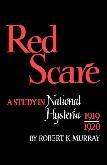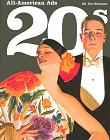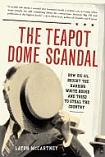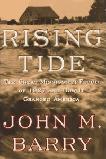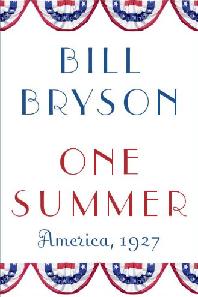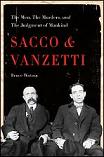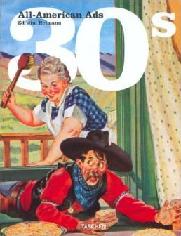
Roaring Twenties Era
- 1920: Good Humor® chocolate-dipped ice cream bar on a stick was invented by Harry Burt at the Burt Confectionery in Youngstown, Ohio.
- 1920: Swift & Company introduced E.K. Pond commercial peanut butter; later adopted hydrogenation technology to become the first emulsified peanut butter sold to the
public; changed name to Peter Pan Peanut Butter in 1928.
- 1920 January: J. Edgar Hoover arrested between 6,000 and 10,000 U.S. residents in 23 states in the infamous Palmer Raids; 3,000 of Hoover's arrest warrants were later declared invalid by the Labor Department.
- 1920 Jan 2: Birthday of author Isaac Asimov in Petrovichi, Byelorussia; he died in 1992.
- 1920 Jan 10: The Treaty of Versailles went into effect, establishing the League of Nations.
- 1920 Jan 16: 18th Amendment prohibiting production & sale of alcoholic beverages declared to be in effect, starting the Prohibition Era (later repealed by the 21st
Amendment).
- 1920 Jan 20: Birthday of cinema master Federico Fellini in Rimini, Italy; he died
in Rome, Italy in 1993.
- 1920 Feb 1: Creation of the Royal Canadian Mounted Police, by merging the Dominion Police and the Royal North West Mounted Police.
- 1920 Feb 14: Founding of the League of Women Voters.
- 1920 Feb 24: The German Workers Party (later the National Socialist German Workers' Party {Nationalsozialistische Deutsche Arbeiterpartei}, abbreviated N.S.D.A.P.,
referred to as 'Nazis'), met in Munich to adopt its platform.
- 1920 April 15: Two employees were killed and nearly $16,000 in payroll money taken at the Slater & Morrill Shoe Factory in South Braintree, Massachusetts; the killers escaped in a car with several other men; anarchists Sacco & Vanzetti were executed for the crime in 1927.
- 1920 May 16: Joan of Arc [1412-31] was canonized by Pope Benedict XV.
- 1920 May 19: Striking miners and local police defended the town of Matewan, West Virginia against hoodlums hired by mine owners; the gunfight resulted in 10 deaths, including the mayor.
- 1920 June 29: Birthday of movie special effects wizard Ray Harryhausen in Los Angeles, California; he died at home in 2013.
- 1920 Aug 16: Birthday of poet & author Charles Bukowski in Andernach, Germany; he died in San Pedro, California in 1994.
- 1920 Aug 18: The 19th Amendment to the U.S. Constitution, which guarantees the right of all American women to vote, was ratified when Tennessee became the 36th state to approve it.
- 1920 Aug 20: Pioneer radio station 8MK in Detroit, Michigan began daily broadcasting; its call letters were later changed to WWJ.
- 1920 Aug 22: Birthday of sci-fi author / poet Ray Bradbury in Waukegan, Illinois; he died in California in 2012 at age 91.
- 1920 Aug 26: 19th Amendment to the U.S. Constitution guaranteeing women the right to vote was ratified and declared to be in effect.
- 1920 Aug 29: Birthday of jazzman Charlie 'Bird' Parker in Kansas City, Kansas;
he died in 1955.
- 1920 Sept 6: Pugilism fans gathered around their radios for the first-ever broadcast of a prizefight; radio station WWJ in Detroit broadcast the match between Jack
Dempsey and Billy Miske; the fight lasted three rounds when Miske dropped Dempsey with a K.O.
- 1920 Sept 16: The Wall Street bombing in New York City; the blast from a wagonload of
dynamite at Noon killed 38 and seriously injured 143; case never solved, but the primary suspects were 'Italian anarchists'.
- 1920 Sept 17: Founding of the American Professional Football Assn. (a precursor of the National Football League) in Canton, Ohio.
- 1920 Sept 20: Birthday of animator Jay Ward in San Francisco, California; the creator
of Rocky & Bullwinkle [1959-64] and other cartoon series died in Hollywood,
California in 1989.
- 1920 Sept 28: Eight members of the Chicago White Sox baseball team were indicted for throwing the 1919 World Series against the Cincinnati Reds; all were acquitted at
trial but were banned from professional baseball for life.
- 1920 Oct 22: Birthday of counterculture icon Timothy Leary, PhD in Springfield, Massachusetts; he died in Beverly Hills,
California in 1996.
- 1920 Dec 1: Official end of the Mexican Revolution, when Álvaro Obregón [1880-1928] was sworn in as President.
- 1921
- Eskimo Pie™ chocolate-dipped ice cream bar went on the market, produced by Russell Stover Candies®; inventor Christian Kent Nelson in Onawa, Iowa was awarded
the patent on 24 January 1922.
- Character 'Betty Crocker' was created to respond to cooking & baking questions received from a Gold Medal flour advertisement in Saturday Evening Post
Magazine.
- Launch of the Baby Ruth® candy bar.
- 1921 March 31: The Green & Green Company of Dayton, Ohio introduced Cheez-Its crackers.
- 1921 May 2: Birthday of cinema master Satyajit Ray in Kolkata (Calcutta), Bengal,
India; he died there in 1992.
- 1921 May 3: West Virginia imposed the first state sales tax.
- 1921 May 21: Taggart Baking Company of Indianapolis, Indiana introduced Wonder® bread.
- 1921 May 31-June 1: Race riot in the Greenwood neighborhood of Tulsa, Oklahoma; official
death toll was 39 lives (ten whites), but other estimates range from 300 to 3,000 deaths.
- 1921 July 14: A jury found Italian anarchists Bartolomeo Vanzetti and Nicola Sacco guilty in the Braintree robbery &
killings; the two were executed for the crime in 1927.
- 1921 July 18: Birthday of original astronaut John Glenn in Cambridge, Ohio; he was the first American to orbit the Earth, served 24 years as U.S. Senator, flew into
space again in 1998 at age 77, and died in 2016 at age 95.
- 1921 July 29: Adolf Hitler became the führer of the National Socialist German Workers Party.
- 1921 Aug 9: The Veterans Bureau was established as part of the national effort to consolidate various Veteran programs, specifically for those from World War I; the
Bureau only lasted until 1930, but its short history is significant to the establishment of the future V.A. system.
- 1921 Aug 10: Future president Franklin D. Roosevelt was stricken with polio at age 39 while vacationing at his summer home
on the Canadian island of Campobello. (Later research and diagnosis suggests that the true condition was
Guillain-Barré syndrome (GBS)).
- 1921 Aug 25: U.S. signed a peace treaty with Germany.
- 1921 Aug-Sept: The five-day 'Battle of Blair Mountain' in Logan County, West Virginia.
Fifty to 100 miners died, 985 were arrested; 10-30 died among those hired by the mining companies.
- 1921 Sept 8: The first Miss America Pageant in Atlantic City, New Jersey.
- 1921 Sept 13: Founding of the White Castle hamburger stand chain in
Wichita, Kansas by Walter A. Anderson, with cook/partner Billy Ingram.
- 1921 Oct 5: First broadcast of baseball's World Series on radio, over station WJZ in Newark, New Jersey.
- 1921 Nov 9: Albert Einstein [1879-1955] was awarded the
Nobel Prize in Physics for his theory of Brownian motion per his
May 1905 paper on the photoelectric effect.
- 1921 Nov 11: President Harding dedicated the {temporary} Tomb of The Unknown Soldier at Arlington National Cemetery in Washington, DC.
- 1922: Chemist Joseph Rosefield added hydrogenated vegetable oil to stabilize peanut butter; the process was licensed to Swift & Company in 1923, becoming the
Peter Pan® brand in 1928; Rosefield began marketing the new product as
Skippy® Peanut Butter in 1933.
- 1922: Invention of the hot fudge sundae, at C.C.
Brown's Ice Cream Parlor in Los Angeles, California.
- 1922 Jan 24: Patent for Eskimo Pie™ chocolate-dipped ice cream bar issued to Christian K. Nelson of Onawa, Iowa and Russell Stover of Chicago, Illinois.
- 1922 Feb 5: Introduction of the Klondike ice cream bar by Isaly Dairy Company in Mansfield, Ohio; the bars
sold for just 10 cents apiece - they're technically cheaper now; launched nationwide in the 1980s; currently owned by Good Humor-Breyers, a division of Unilever.
- 1922 Feb 5: Publication of the first issue of Reader's Digest Magazine.
- 1922 Feb 21: Crash & explosion of Italy-built Roma semi-rigid hydrogen airship during U.S. Army testing at Norfolk Naval Station in Virginia; 34 crew members
died, eleven on board miraculously survived.
- 1922 Feb 27: The U.S. Supreme Court decision Leser v. Garnett upheld the 19th
Amendment, which guarantees women the right to vote.
- 1922 March 12: Birthday of Beat writer Jack Kerouac in Lowell, Massachusetts; he died in
1969 in
St. Petersburg, Florida.
- 1922 April 14: The Wall Street Journal broke the news story about oil leases that led to Senate investigations and criminal trials known as the
'Teapot Dome Scandal'.
- 1922 May 30: Dedication of the Lincoln Memorial in Washington, DC by Chief Justice William Howard Taft.
- 1922 June 10: Frances Ethel Gumm was born in Grand Rapids, Minnesota; she later became famous as singer and actress
Judy Garland; she died in 1969 at age 47 in London, England.
- 1922 June 14: Warren G. Harding became the first U.S. President heard on radio as station WEAR in Baltimore, Maryland broadast his speech dedicating the Francis Scott Key memorial at Fort McHenry.
- 1922 July 11: Opening of the Hollywood Bowl outdoor concert performance space.
- 1922 July 18: Birthday of historian & philosopher Thomas S. Kuhn in Cincinnati, Ohio; he died at age 73 in 1996.
- 1922 Aug 24: Birthday of activist-historian Howard Zinn; he died at age 87 in
Santa Monica, California in 2010.
- 1922 Aug 28: Broadcast of the first-ever radio commercial on WEAF in New York City; the 10-minute ad was for the Queensboro Realty Company, which had paid a fee of $100.
- 1922 Sept: Clarence Birdseye founded Birdseye Seafoods, Inc. in New York City to process flash-frozen fish fillets.
- 1922 Sept 11: The British Mandate for Palestine went into effect.
- 1922 Oct 18: Opening of the Egyptian Theatre in Hollywood, California.
- 1922 Oct 18: Founding of the British Broadcasting Company, Ltd. (later renamed the B.B.C.).
- 1922 Oct 27: First celebration of the annual Navy Day in the U.S.
- 1922 Oct 27-29: The March On Rome: Black-shirted fascists led by
Benito Mussolini [1883-1945] entered the city and pulled off a bloodless coup; Italy's king
appointed Mussolini Prime Minister and authorized him to form a government, leading to two decades of Fascist Party rule.
- 1922 Nov 4: Discovery of the entrance to King Tutankhamen's tomb in Egypt.
- 1922 Nov 11: Birthday of author Kurt Vonnegut, Jr. in Indianapolis, Indiana; he died in 2007 in New York City.
- 1922 Nov 14: Launch of the British Broadcasting Company's domestic radio service.
- 1922 Nov 21: White supremacist Rebecca L. Felton was sworn in as U.S. Senator from Georgia, the first woman and the oldest freshman (at age 87) in Senate history; she served only one day.
- 1922 Nov 26: Birthday of cartoonist Charles M. Schulz [1922-2000] in Minneapolis, Minnesota; he created the
Peanuts® comic strip in 1950.
- 1922 Dec 6: The Irish Free State came into existence per the Anglo-Irish Treaty signed a year earlier.
- 1922 Dec 6: Publication of James Joyce's "Ulysses"; the book was banned immediately in the U.S. and England; but on this day 11 years later, in 1933, a U.S. federal
judge ruled that it was not obscene.
- 1922 Dec 30: Vladimir I. Lenin proclaimed the Union of Soviet Socialist Republics.
- 1923: Russell Stover Candies® went on the market.
- 1923 Feb 14: Velveeta Cheese Company incorporated in Monroe, New York; bought in 1927 by Kraft Foods.
- 1923 March 2: Launch of Time Magazine by Henry R. Luce.
- 1923 April 22: Birthday of iconic pin-up model Bettie Page in Nashville, Tennessee; she died at age 85 in 2008.
- 1923 May 2-3: First nonstop flight across America took 26 hours and 50 minutes.
- 1923 June 13: Date of the party given by "Mrs. Dalloway" in the 1925 novel by Virginia Woolf [1882-1941].
- 1923 July 13: Official dedication of the 'HOLLYWOODLAND' sign with 50-foot-tall letters to advertise the Hollywoodland real estate development in Beachwood Canyon.
- 1923 July 20: Mexico's retired revolutionary general Francisco 'Pancho' Villa
was assassinated in his automobile in the town of Parral, Chihuahua.
- 1923 Aug 2: President Warren G. Harding died in San Francisco, California; Vice President Calvin Coolidge became President.
- 1923 Sept 1: An earthquake of magnitude 7.9 hit Japan, devastating Tokyo and Yokohama; firestorms and typhoon winds caused as many as 140,000 deaths and the loss of
447,000 homes.
- 1923 Sept 17: Birthday of singer / songwriter Hank Williams in Mount Olive, Alabama; he died while on tour on
New Year's Day 1953.
- 1923 Nov 8: Adolf Hitler's first attempt to seize power in Germany failed; the two-day Munich uprising became known as the
'Beer Hall Putsch'. Hitler and others were put on trial for treason; Hitler served only
eight months in prison, during which time he and Rudolf Hess wrote "Mein Kampf".
Timelines of History 1924-25
- 1924
- Pyrex® cookware went on the market.
- First U.S. execution using hydrocyanic gas, of a Chinese tong member at the Nevada State Prison in Carson City.
- Painted roadway center lines law passed by California legislature after a long campaign by Dr. June McCarroll of Indio, California.
- Whole wheat flakes ready-to-eat breakfast cereal accidentally invented by a health clinician in Minneapolis; process perfected by George Cormack, head miller at
Washburn Crosby Co.; eventually marketed as Wheaties®.
- Frank Stewart opened the first Stewart's Root Beer Stand in Mansfield, Ohio to supplement his school teacher income during the summer.
Stewart's Original Fountain Classics sodapop is now owned by a conglomerate and located in Rye Brook, New
York; the Stewart's Drive-In Restaurants chain operates five locations in New Jersey.
{See also DJ's Stewart's Root Beer fansite.}
- Nehi™ soft drinks introduced in Columbus, Georgia.
- Roy Allen opened the first drive-in restaurant - part of the A&W Root Beer restaurant chain - in
Sacramento, California.
- Iodized salt was introduced in the U.S. A study in 2013 found that this one change in diet raised the country's collective I.Q.
- 1924 Jan 13: Birthday of philosopher Paul K. Feyerabend [1924-94] in Vienna,
Austria; he taught for 30 years at U.C. Berkeley, and died in 1994 in Switzerland.
- 1924 Feb 8: First coast-to-coast radio broadcast.
- 1924 Feb 22: Calvin Coolidge delivered the first radio broadcast from the White House.
- 1924 May 10: J. Edgar Hoover [1895-1972] was appointed Director of the F.B.I.
- 1924 May 21: 14-year-old Bobby Franks was murdered in a 'thrill killing' by his cousin Richard Loeb and Loeb's fellow University of Chicago student Nathan Leopold, Jr.
Both of the Leopold and Loeb team were convicted and sentenced to life in prison plus 99
years. (Loeb was killed by a fellow prisoner in 1936; Leopold was released from prison in 1958.)
- 1924 June 2: Congress granted U.S. citizenship to all American Indians.
- 1924 July 4: Caesar salad was invented by restaurateur Caesar Cardini [1896-1956] at the Hotel
Cesar on Avenida Revolución in Tijuana, Mexico when holiday crowds depleted other kitchen supplies; the original recipe did not include anchovies, which seems to have
been added in Hollywood in the 1940s.
- 1924 July 30: Birthday of Xicano author José Antonio Villarreal in Los Angeles, California; he died there in 2010.
- 1924 Aug 2: Birthday of author James Baldwin in Harlem, New York City; he died in 1987.
- 1924 Aug 5: Debut of Harold Gray's comic strip Little Orphan Annie in the New York Times.
- 1924 Sept 16: Birthday of actress Lauren Bacall in New York City; she died there
in 2014 at age 89.
- 1924 Sept 28: Two U.S. Army aeroplanes landed in Seattle, Washington to complete the
first round-the-world flight, which took 175 days.
- 1924 Nov: Launch of Wheaties® Whole Wheat Flakes ready-to-eat breakfast cereal.
- 1924 Nov 25: Macy's Department Store held its first Thanksgiving Parade in New York City.
- 1925: Beginning of the Goodyear blimp program.
- 1925 January: Release of the first sound-on-film movie "Come Take A Trip In My Airship" {IMDb}, made from the silent version of March 1924; the 'Song Car-tune Series' animated short by
Fleischer Studios used the De Forest Phonofilm sound-on-film process.
- 1925 Jan 5: Nellie T. Ross of Wyoming became America's first female governor.
- 1925 Feb 20: Birthday of movie director Robert Altman in
Kansas City, Missouri; he died in Los Angeles, California in 2006.
- 1925 Feb 21: Birthday of film director Sam Peckinpah in Fresno, California;
he died in 1984 in Inglewood, California.
- 1925 Feb 21: Founding of The New Yorker Magazine.
- 1925 March 13: The Tennessee legislature passed a law that made teaching of evolution
there unlawful.
- 1925 March 18: The Tri-State Tornado swept over 200 miles in 3½ hours, starting in southeastern Missouri, crossing southern Illinois, and ending in southwestern
Indiana; some 700 people were killed and over 2,000 injured.
- 1925 March 21: Tennessee Gov. Austin Peay signed the Butler Act, which made teaching of evolution unlawful in public schools. The Butler Act was repealed in May 1967 {better late than never!}.
- 1925 April 10: Publication of F. Scott Fitzgerald's classic novel "The Great
Gatsby".
- 1925 May 5: Tennessee schoolteacher John T. Scopes [1900-70] was charged with violating a new state law
prohibiting the teaching of evolution.
- 1925 May 19: Birthday of Malcolm Little in Omaha, Nebraska; he became activist Malcolm X
and was assassinated in 1965.
- 1925 May 27: Birthday of mystery author Tony Hillerman in Sacred Heart, Oklahoma;
he died in 2008 in Albuquerque, New Mexico.
- 1925 June 3: The first flight of an airship (or 'blimp') built by the Goodyear Tire & Rubber Company named “Pilgrim” in the skies over Akron, Ohio.
- 1925 June 6: Founding of the Chrysler Corporation by Walter Percy Chrysler.
- 1925 June 29: The magnitude 6.8 Santa Barbara, California earthquake destroyed the historic Downtown, but resulted in only 13 deaths.
- 1925 July 10: Scopes 'Monkey Trial' began in Dayton, Tennessee.
- 1925 July 18: German radical Adolf Hitler published "Mein Kampf (My Battle)".
- 1925 July 21: John T. Scopes was convicted of teaching evolution, and fined $100;
conviction later overturned on appeal.
- 1925 Aug 29: Birthday of Western author Max Evans in Ropes, Texas; he lived for many
years in Albuquer-que, New Mexico and died there on 26 August 2020 in hospice care at the V.A.
Hospital at age 95.
- 1925 Oct 3: Birthday of author Gore Vidal in West Point, New York; he died at age 86 at home in Hollywood, California.
- 1925 Oct 11: Birthday of mystery author Elmore Leonard [1925-2013] in
New Orleans, Louisiana.
- 1925 Oct 13: Birthday of Leonard Alfred Schneider in Mineola, New York; he became the comic Lenny Bruce, and died at age 40 in Los Angeles, California in 1966.
- 1925 Nov 28: The 'Grand Ole Opry' radio program made its debut on Nashville's WSM.
- 1925 Dec 12: Opening of the first motel in America, the Milestone Mo-tel Inn in San Luis Obispo,
California.
- 1925 Dec 25: Birthday of anthropologist & author Carlos Castañeda in Peru; he died
in West Los Angeles, California in 1998.
Timelines of History 1926-27
- 1926
- Frederic J. Fisher [1878-1941] and his brother Charles [1880-1963] sold their Fisher Body Company to General Motors.
- Montgomery Ward opened its first store in Plymouth, Indiana; the company folded in 2001.
- The first spring-driven, pop-up toaster was introduced by Toastmaster.
- Erik Rotheim of Norway invented the aerosol can.
- 1926 Jan 13: Birthday of English author (Thomas) Michael Bond, CBE; he was best known for his 'Paddington Bear' series
of children's books; he died in 2017.
- 1926 Feb 8: Birthday of Beat author Neal Cassady in Salt Lake City, Utah; he died in 1968 in Mexico.
- 1926 Mar 6: Birthday of economist Alan Greenspan in New York City; he served as
Chairman of the Federal Reserve from 1987 to 2006.
- 1926 March 16: Dr. Robert H. Goddard successfully launched the first liquid-fueled rocket near Auburn, Massachusetts.
- 1926 March 17: Publication of bestseller "The Story of Philosophy"
by Will & Ariel Durant.
- 1926 April 3: Dr. Goddard launched his second flight of a liquid-fueled rocket.
- 1926 April 9: Birthday of publisher-hedonist Hugh M. Hefner in Chicago; he died in 2017 at age 91.
- 1926 April 21: Birthday of Elizabeth Alexandra Mary Windsor in Mayfair, London; she became Britain's Queen Elizabeth II in 1952 and reigned longer than Queen Victoria:
70 years and 7 months; she died in September 2022 at age 96.
- 1926 April 28: Birthday of (Nelle) Harper Lee in Monroeville, Alabama; her novel "To Kill A Mockingbird" was a bestseller in 1960, won the Pulitzer Prize in 1961, and the 1962 movie won three Oscar® Awards; she lived pretty much as a recluse and died in 2016 at age 89.
- 1926 May 18: Evangelist Aimee Semple McPherson vanished while visiting a beach in Venice, California; she reappeared a month later, claiming to have been kidnapped.
- 1926 May 25: Birthday of American jazz trumpeter & composer Miles Davis in Alton, Illinois; he died at a hospital in California in 1991 at age 65.
- 1926 June 1: Birthday of actress Marilyn Monroe {nee Norma Jean Mortenson, later Norma Jean Baker} in Los Angeles, California; she died in 1962 of a drug overdose,
possibly accidental; she was 36 years old.
- 1926 June 3: Birthday of Beat poet Allen Ginsberg in Newark, New Jersey;
he died in 1997.
- 1926 July 2: Congress established the U.S. Army Air Corps.
- 1926 July 14: Archeologist Frank Figgins found a spear point embedded into the matrix of rock containing 10,000 year-old bones of ancient bison in eastern New Mexico,
establishing the existence of what came to be called the Folsom Tradition.
- 1926 Aug 6: Warner Bros. premiered "Don Juan" in New York City, the first film using the Vitaphone sound-on-disc system (featuring music & sound effects).
- 1926 Aug 23: The death of silent film actor Rudolph Valentino at age 31 caused a
worldwide frenzy among his fans.
- 1926 Sept: The severe hurricane that devastated Miami, Florida was the final blow that burst the Florida land bubble and led to the economic Great Depression of 1929.
- 1926 Sept 9: The Radio Corporation of America created N.B.C., the National Broadcasting Company.
- 1926 Sept 23: Birthday of influential jazz saxophonist John Coltrane in Hamlet, North Carolina; he died in 1967.
- 1926 Oct 14: First publication in book form of "Winnie The Pooh" by A.A. Milne.
- 1926 Oct 15: Birthday of American writer Evan Hunter {nee Salvatore Lombino} in New York City; he also wrote as Ed McBain; he died in 2005.
- 1926 Oct 22: Publication of Ernest Hemingway's first novel "The Sun Also Rises".
- 1926 Nov 15: The National Broadcasting Company debuted with a radio network of 24 stations.
- 1926 Dec 25: Hirohito became Emperor of Japan, upon the death of his father Yoshihito Emperor Taisho; Hirohito reigned until 1989 and was named Emperor Showa.
- 1926-27 The Great Mississippi Flood of 1927: After heavy rains from the Summer of 1926 to Spring 1927, the Mississippi River broke out of its levee system in April 1927 in 145 places, flooding 27,000 square miles (70,000 km2) – an area 80 km (50 miles) wide and more than 160 km (99 miles) long. The area was inundated up to a depth of 30 feet (10 meters), causing over $400 million in damages and killing 246 people in seven states.
- 1927: Edwin E. Perkins invented Kool-Aid® in Hastings, Nebraska; celebrated at the town's
'Kool-Aid Days' in August.
- 1927 Jan 7: Launch of trans-Atlantic telephone service, between New York City and London, England.
- 1927 Jan 29: Birthday of eco-activist / author Edward Abbey in Indiana, Pennsylvania; he died in Tucson, Arizona in 1989.
- 1927 March 31: Birthday of labor activist Cesar E. Chavez outside Yuma, Arizona; he died in 1993 in San Luis, Arizona.
- 1927 April 9: After lengthy appeals, Italian anarchists Bartolomeo Vanzetti and Nicola Sacco were sentenced to death by Judge Thayer.
- 1927 May 4: Founding of the Academy of Motion Picture Arts & Sciences.
- 1927 May 18: Opening of Grauman's [now Mann's] Chinese Theatre in Hollywood, California.
- 1927 May 19-20: Aviator Charles Lindbergh made the first successful solo flight across the Atlantic Ocean, traveling nonstop from Roosevelt Field in Long Island, New York to Paris, France in 33.5 hours.
- 1927 June 1: Launch of the Hardy Boys Mystery Series books from Stratemeyer Syndicate, with publication of the first three books.
- 1927 June 13: Aviator Charles Lindberg was honored with a ticker-tape parade in New York City.
- 1927 July 4: Birthday of playwright Neil Simon in The Bronx, New York; he died in 2018 at age 91.
- 1927 Aug 7: Official dedication of the already-opened Peace Bridge connecting Buffalo, New York and Port Erie, Ontario, Canada.
- 1927 August 23: Execution of the unjustly-convicted Italian anarchists Bartolomeo Vanzetti and Nicola Sacco, along with bankrobber Celestino Madeieros.
- 1927 Sept 7: Invention of all-electronic television by Philo T. Farnsworth [1906-71] in San Francisco, California.
- 1927 Sept 18: Debut of the Columbia Phonograph Broadcasting System [later C.B.S.] with a network of 16 radio stations.
- 1927 Sept 22: Heavyweight boxer Gene Tunney defended his title against Jack Dempsey in the famous 'long count' fight in Chicago.
- 1927 Oct 6: Talking pictures arrived with the opening of "The Jazz Singer", starring Al Jolson; the movie featured both silent & synchronous-sound scenes.
- 1927 Nov 12: Marxist leader Leon Trotsky and Bolshevik politician Grigory Zinoviev were expelled from the Communist Party, and Joseph Stalin became the undisputed ruler of the Soviet Union.
- 1927 Nov 13: The Holland Tunnel beneath the Hudson River opened to traffic, providing access between Lower Manhattan and New Jersey.
- 1927 Nov 21: State police fired on striking coal miners at the Columbine Mine in northern Colorado; six miners were killed and dozens were injured.
- 1927 Dec 2: Ford Motor Company unveiled the 'Model A' automobile, successor to the Model T.
- 1928
- Jolly Green Giant® brand placed on the market.
- William Dreyer partnered with candy-maker Joseph Edy to found a small ice cream factory in Oakland, California.
- Launch of Reese's Peanut Butter Cups.
- Introduction of the standard 4-foot by 8-foot plywood construction panel.
- 1928 Feb 26: Official opening of the Moffat Tunnel on the Denver & Salt Lake Railway of Colorado, still in heavy use today by the Union Pacific Railroad.
- 1928 March 12: Release of "The Treasurer's Report", a hilarious short starring Robert Benchley, which is actually the first ALL-sound movie in general release.
- 1928 March 12: Collapse of William Mulholland's St. Francis Dam just before midnight in the San Fran-cisquito Valley (now Canyon Country) of Southern California; roughly 400 people died in the flooding.
- 1928 March 20: Birthday of children's TV host Fred Rogers in Latrobe, Pennsylvania;
he hosted the daily "Mister Rogers' Neighborhood" TV shows from 1961-2001; he died in 2003 at home in Pittsburgh, PA.
- 1928 May 15: Birthday of Mickey Mouse, whose first public appearance was at a test screening of the silent b&w
cartoon short "Plane Crazy".
- 1928 June 17-18: Aviator Amelia Earhart [1897-1937] became the first woman to fly across the Atlantic, as a passenger with pilots Wilmer Stultz and Louis Gordon.
- 1928 June 20: Founding of General Mills, Inc. by merger of 5 companies.
- 1928 Sept 27: The United States recognized the Nationalist Chinese government of Chiang Kai-shek.
- 1928 Sept 28: Sir Alexander Fleming of Scotland discovered penicillin, for which he received a shared Nobel Prize in 1945.
- 1928 Oct 6: Chiang Kai-Shek [1887-1975] became president of China.
- 1928 Nov 18: The first successful synchronous sound animated cartoon premiered in New York City - Walt Disney's "Steamboat Willie", starring Mickey Mouse.
- 1928 Dec 7: Birthday of philosopher-activist Noam Chomsky in Philadelphia, Pennsylvania; he currently lives in Lexington, Massachusetts.
- 1928 Dec 16: Birthday of author Philip K. Dick in Chicago, Illinois; he died in 1982.
- 1928 Dec 21: President Calvin Coolidge signed the bill approving the Boulder Canyon Project (Hoover Dam).
- 1928 Dec 23: The National Broadcasting Company launched their permanent coast-to-coast radio network.
- 1929 Jan 15: Birthday of civil rights leader Rev. Martin Luther King, Jr. in Atlanta, Georgia; he was assassinated in Memphis, Tennessee in 1968.
- 1929 Jan 17: Popeye the Sailor appeared in the first daily "Thimble Theater" comic strip.
- 1929 Jan 31: Revolutionary Leon Trotsky [1879-1940] and his family were expelled from the Soviet Union.
- 1929 Feb 14: Gangster Al Capone machine-gunned to death seven rivals in a Chicago garage in the 'St. Valentine's Day Massacre'.
- 1929 Feb 26: President Coolidge signed legislation establishing Grand Teton National Park.
- 1929 May 15: Birthday of author Denne Bart Petitclerc in Washington State; he died at age 76 in Los Angeles, California.
- 1929 May 16: First Academy Awards banquet.
- 1929 June 7: The sovereign state of Vatican City came into existence.
- 1929 July 28: Birthday of Jacqueline Lee Bouvier Kennedy Onassis in Southampton, New York; after marriages to John F. Kennedy [1917-63] and billionaire Aristotle Onassis [1906-75], she died in New York City at age 64 in May 1994.
- 1929 Oct: Charles Leiper Grigg invented the formula for a lemon-lime patent medicine in St. Louis, Missouri; originally called 'Bib-Label Lithiated Lemon-Lime Soda', the brand name was changed to Seven-Up™ and 7Up™ in 1936.
- 1929 Oct 21: Birthday of sci-fi author Ursula K. Le Guin in Berkeley, California; she lived in Portland, Oregon from 1959 until her death in January 2018 at age 88.
|



![]()
 back to Spirit of America Bookstore homepage
back to Spirit of America Bookstore homepage

